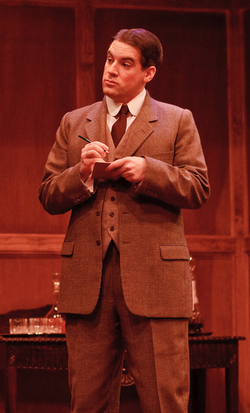Inspector Goole Cheat Sheet: Quotes + Notes
|
Goole, or Ghoul?
Inspector Goole is key to An Inspector Calls. But before we can understand his key quotes, we must analyse his character. 1/4: Inspector Goole Character Notes
The Inspector is in his fifties, dressed in a plain dark suit.
He initially seems to be an ordinary Brumley police inspector, yet he is eventually something more ominous, perhaps even supernatural... JB Priestly writes that The Inspector 'need not be a big man, but he creates at once an impression of massiveness, solidity and purposefulness'. Inspector Goole questions every Birling member, from the older generation of Mr Birling to the youngest character of Sheila Birling, as well as Gerald Croft. Throughout these interrogations, Priestley describes the Inspector's 'disconcerting habit of looking hard at the person he addresses before he speaks'. Now that we have understood his character, we will be able to better understand the context of his key quotes: |
|
2/4: Inspector Goole: Quote Bank
Key quotes, sorted by time.
After reading these quotes, scroll down for analysis of these.
After reading these quotes, scroll down for analysis of these.
- Intimidating power: “Need not be a big man but he creates at once an impression of massiveness, solidity and purposefulness.”
- A mind reader? "He speaks carefully, weightily and has a disconcerting habit of looking hard at the person he addresses before actually speaking”.
- “Two hours ago a young woman died in the Infirmary. She’d been taken there this afternoon because she’d swallowed a lot of strong disinfectant. Burnt her inside out, of course”
- “A chain of events” lead to Eva Smith's suicide.
- “...It’s better to ask for the Earth than to take it”
- “...It would do us all a bit of good if sometimes we tried to put ourselves in the place of these young women counting their pennies in their dingy little back bedroom”
- (To Gerald) “And you think young women ought to be protected against unpleasant and disturbing things?”
- “A girl died tonight. A pretty, lively sort of girl, who never did anybody any harm. But she died in misery and agony- hating life-”
- “If there’s nothing else we have to share our guilt”
- “Public men, Mr Birling, have responsibilities as well as privileges”
- “You’ve had children. You must have known what she was feeling. And you slammed the door in her face”
- “And be quiet for a moment and listen to me. I don’t need to know any more. Neither do you. This girl killed herself- and died a horrible death. But each of you helped to kill her. Remember that. Never forget it. (He looks from one to the other of them carefully) But then I don’t think you ever will. Remember what you did”
- “But remember this. One Eva Smith has gone- but there are millions and millions and millions of Eva Smiths and John Smiths still left with us, with their lives, their hopes and fears, their suffering and chance of happiness, all intertwined with our lives, and what we think and say and do. We don’t live alone. We are members of one body. We are responsible for each other. And I tell you that the time will soon come when, if men will not learn that lesson, then they will be taught it in fire and blood and anguish. Good night.”
Now that we have read Goole's key quotes, we will analyse the most important of these:
3/4: Inspector Goole: Important Quotes - Analysis
|
|
Now that we have seen his key quotes, it is necessary to understand what these mean.
|
4/4: Priestley's Message (intended effect on the audience)
Goole doesn't change. In terms of character development, Priestley's message is that the Inspector has already found his morals. Goole is one of the only characters that does not change as the play progresses. He always remains assertive throughout the play. However, he gains more control over the characters as the play progresses.
- He is Priestley’s voice – he represents Priestley's strong moral views. His job is to make the characters change their attitudes, face up to what they have done and start taking responsibility for each other – see his final message in the play.
- He heightens drama – his entrances and exits are well timed in order to create maximum tension (e.g. at the end of Act 1 when he walks in on Gerald and Sheila’s conversation).
- He controls the structure of the play – each revelation moves the play one step forward.
You might like this:
- All Inspector Calls Notes
- Mr Birling Quotes and Notes 🔥
- Learn Faster - Study Hacks
- Search by keyword (e.g. Sheila, or Social Class):
Help more students succeed
Students have shared this page to Facebook, Twitter, TikTok and WhatsApp.
GCSE/IGCSE Notes > English Literature > Inspector Goole - An Inspector Calls🕵️
